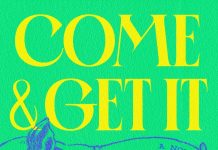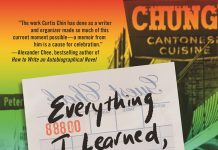
Big TV contest winners like Ken Jennings often parlay their prominence into careers in the public eye. Andy Kravis, a Farmington Hills native, deliberately went the opposite direction after he won what remains the largest single game-show prize — $2.6 million. The show was The Million Second Quiz, a trivia stunt that lasted two weeks on NBC in the summer of 2013, after which the network did “a very good job of burying the archival footage,” Kravis says. That’s just as well for Kravis, who says he didn’t “have to deal with the consequences of being well known” while also using the largesse to do “what I’ve been able to do with my life.”
Kravis was at Columbia University Law in New York when he won the money that allowed him to focus on something few people can make a living at: writing crosswords. Indeed, without that money, it’s doubtful he could have afforded to become, as the prolific Ann Arbor-based crossword constructor Peter A. Collins put it, “a kind of rock star.”
Since last summer, Kravis has served as assistant puzzles and games editor at The New Yorker, having bounced to that gig from a similar job at The New York Times under crossword legend Wil Shortz. In both roles, Kravis, who is gay, has championed a new wave of constructors bringing modern language and fresher clues to the daily pastime of millions who never think much about how puzzles are created. The 32-year-old spoke with Hour Detroit about his journey to the heart of the world of acrosses and downs — and how he sneaks Michiganalia in whenever he can get away with it.
Hour Detroit: Were you always interested in puzzles and games?
Andy Kravis: As a kid, I was more interested in trivia. As a family, we’d watch Wheel of Fortune and Jeopardy! every night. I probably leaned more toward the Jeopardy! side of things. But in my early teens, I would look over my mom’s shoulder when she would solve The Times’ Sunday puzzle, which is reprinted in the Free Press.
When did you become a solver?
When I was in college at University of Michigan, I worked in the [liberal arts studies] honors office and every day we would run off 30 Xeroxes of The New York Times puzzle to put out in the student lounge. I would run an extra one for myself. That’s how you do it — you just do a lot of puzzles and eventually you get good at it.
How do you go from solving puzzles to making puzzles?
I moved to New York for law school and I watched the documentary Wordplay, which, for a lot of crossword enthusiasts, got them into it. The American Crossword Puzzle Tournament, which is featured in the movie, was taking place in Brooklyn at the time. I thought, “Well, I like crosswords, I’ll go see what it’s all about. I think it’ll be fun, I think I’ll be decent at it.” I got my butt kicked. So I started solving way, way more puzzles. It was the time of a boom of puzzle blogs — people made puzzles on their own and posted them to get their names out there and publish their work without editorial supervision so you could do a lot of things you couldn’t do in The Times. I started doing that and I got to know more folks in the crossword world.
When did you first publish a puzzle?
I had ideas I might want to publish, so I emailed Will Nediger, who I knew from Quiz Bowl when I was at U-M and who is a well-known constructor. He helped me refine the idea, which involved inserting “BLE” into common phrases to make other phrases, and showed me how to build a grid and lay clues. We submitted that to The New York Times, but it was too similar to something they had recently run. So we sent it to the L.A. Times and they ran it in May 2012. I was published in The New York Times about a year after that.
How did winning that $2.6 million impact your life?
I had just gotten out of law school and taken the Bar. I was trying to get civil rights legal work and, also, as a side hustle, I had been making crosswords. When this windfall came into my lap, I thought, “I’m not having any real luck getting more work in this field and I’m much happier and healthier doing this lower-stress work of crosswords, so I might as well give it a go and try to pursue it full time.”
Do you ever slip Michigan stuff into puzzles, either your own or ones you’re editing?
In a roundabout way, yes. You can’t help but do it. The fill that comes up so often is “OSU” — it’s so helpful for crosswords as a three-letter abbreviation — so I will almost always clue that as “Wolverine rival” or sneak in Michigan into the clue some other way. I can’t clue that as “team that’s way worse than Michigan” or “school I didn’t go to because I wanted to go to Michigan” because you can’t editorialize like that. But I also think my voice and my sensibility is a little bit Michigan in that Midwestern politesse kind of way. I’ve certainly used Ann Arbor as a clue or “ANN” before. Ypsilanti is not as helpful for a puzzle as one might hope.
There are several well-regarded, very prolific puzzle constructors in metro Detroit. Are there hotspots of puzzling communities?
Yes, there are. The biggest hotspot is New York. If you grew up in New York City, you had access to The Times growing up. That was not something I had. We had the Free Press or the Detroit News or a local paper —the Farmington Observer. If you grew up with The Times, you grew up with The Times crossword. But you also see a lot of interest in crosswords in bigger cities and in college towns like Ann Arbor. A lot of the new constructors are college-age people, partly because they’re just getting into crosswords for the first time and, most importantly, they have a lot of time on their hands.
Are there terms you were first to get into a The New York Times puzzle?
I don’t necessarily think about whether I’ll be first, but I am very careful about the things I put in the puzzle and whether they are representative of culture writ large. I’m looking now, and a couple of things I’m pleased to say I was first to put in the puzzle include “AVA DUVERNAY,” “BECHDEL,” “CISWOMEN,” “GAYBORHOOD,” and “GENDER STUDIES.”
As new terms enter the puzzle, do old-guard solvers rebel?
Yes. Some people are resistant to seeing increased representation of these sorts of terms that appeal to or are more known by gay Americans or Black Americans or women or any non-dominant culture. But you’ve got Crossword Twitter and various crossword websites where people are thrilled and pleased to see “gayborhood” or “Ava DuVernay” and people say, “Oh, I see myself in the puzzle in a way I haven’t before.” For every detractor there’s a supporter. I tend to favor puzzles that have some individual constructor’s voice shining through and with new and interesting vocabulary. Often that will come from a place of diversity.
There are celebrities who would be forgotten if not for their names’ usefulness in crosswords. Do you try to avoid those?
Without a doubt. People have gotten better at making puzzles, and part of getting better is excising these unfamiliar names and using fresher references. But a lot of these are celebrities I learned about through crosswords, so I’m grateful to crosswordese for teaching me so many discreet things I would’ve had no other way to encounter. And occasionally an old piece of music will show up. One that comes to mind is “Inka Dinka Doo.” This is an old Jimmy Durante song that’s only in the puzzle because “INKA” is four weird combination of letters. But you go listen to the song if you’re encountering it for the first time and you’re curious about it. “Goodnight Irene” is a song that I didn’t know before I started solving puzzles.
I feel bad for Charlotte Rae because now that Issa Rae is in the world, we don’t need her anymore.
Yeah, and Carly Rae Jepsen, too. She was the first to take that star away from her. But now I know who was on The Facts of Life, a show I’ve never watched!
|
|
|









